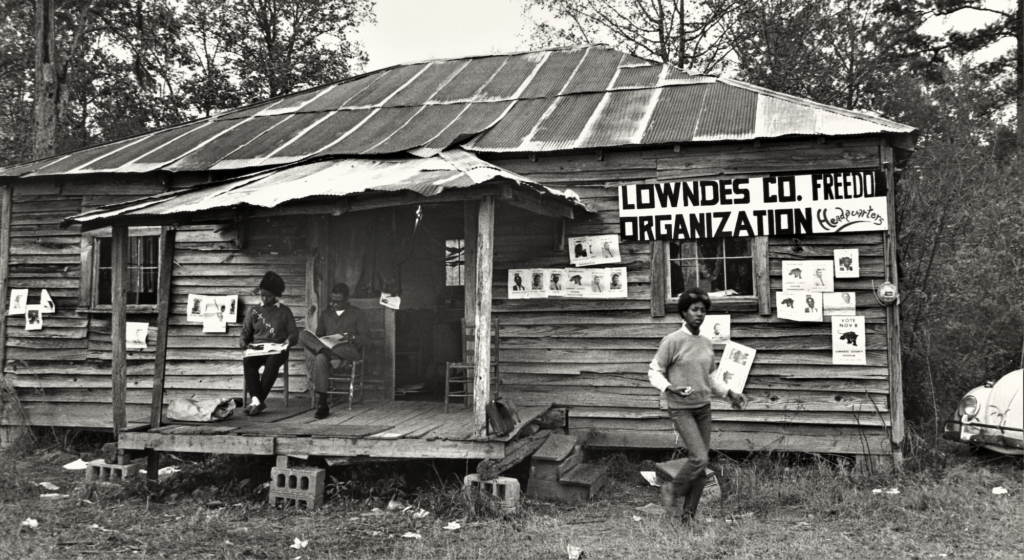“Strong people don’t need strong leaders: the emphasis was on the organizing,” civil rights activist Jennifer Lawson tells us in “Lowndes County and the Road to Black Power,” Geeta Gandbhir (“Black and Missing”) and Sam Pollard’s (“Mr. Soul!”) documentary recounting the battle for Black suffrage and political justice in the Georgian county during mid-century America. Lawson here alludes to the ethos of bottom-up organizing endorsed by Ella Baker, a prominent architect of the American civil rights movement who co-founded the Southern Christian Leadership Conference (SCLC), led by Martin Luther King, Jr, and paved the way for the Student Nonviolent Coordinating Committee (SNCC).
Baker’s insistence on community organizing is the through line of “Lowndes County,” which revisits archival footage and interviews frontline organizers of the grassroots struggle for Black voting rights and representative government in the 1960s. As one SNCC member expresses in the doc, “If you wanted to end the brutality of the sheriff, you needed to become the sheriff. If you wanted better education, you needed to control the mechanisms of education.”
The film retraces this uphill battle led by the SNCC and Lowndes County Freedom Organization (LCFO) – the precursor to the Black Panther Party – that facilitated the democratic participation of Black Americans. More than a history lesson, “Lowndes County” pays tribute to the unsung sacrifices made by the brave community members, and allies, who risked their lives at a time of senseless violence against freedom fighters by white supremacist institutions and detractors.
In the ‘60s, Lowndes County boasted an 80 percent Black population, a disenfranchized majority, with zero locals registered to vote in an area governed by white political officials. With the high rates of white violence against Black folks to maintain segregation, the region earned the nickname “Bloody Lowndes” for the “unrelenting violence [that arises] if you’re trying to get Black rights,” explains Judy Richardson, an early participant of SNCC and a protégé of Baker. The filmmaker adds, “I’m amazed that Black folks […] still organized, still tried to vote, and still did all the things that are about being a vital part of this democracy.”
“Lowndes County” resurrects and gives due credit to an oft neglected chapter of American history, a monumental campaign that preceded even the 1965 Selma to Montgomery march. “What happened in Lowndes is the model for much of the organizing that happens today around these issues,” Gandbhir told us, revealing that she, too, had not previously heard of the organizing in Lowndes County. “Martin Luther King and the SCLC weren’t involved, so it doesn’t fit in with the more traditional narrative of the civil rights movement — so it’s been underrepresented in American history.”
Those in power are also those with narrative control. “Lowndes County” reminds modern audiences the meaning of Black Power as defined by the forerunners of the movement, separate from the bastardized concept propagated by white newspapers at the time. Archival footage sees Andrew Young of the SNCC reflecting on the distortion of Black Power by the media and general public: “When white Americans heard Blacks say Black Power and clench their fist, in their mind, Blacks were now going to do to them all the evil things that whites had done to Blacks in the last 200 years,” he says. According to Young, such extremism wasn’t harbored by even the most militant of freedom fighters. Instead, “Black Power meant for them the right to determine their own destiny.”
Beyond the “triumph, sorrow, and rage” that the film will elicit in viewers, Gandbhir told us that she wants the history of Lowndes County to ignite in contemporary audiences the same urgency for political reform that fueled the SNCC and LCFO. Although more than a half-century apart, the director hopes that viewers will borrow from the wisdom of our forebears in the ongoing crusade for racial and political justice. “We are living in a really difficult time where our democracy hangs in the balance, and we want people to be able to leave with tools and to help them mobilize in their own communities,” she explained. “The people of Lowndes County and the SNCC organizers, and what they did during a time where it was literally life or death, I think should inspire anyone to believe that in this day and age, they can do the same.”
“Lowndes County and the Road to Black Power” is now in theaters and available on VOD. The doc premiered at this year’s Tribeca Film Festival and is a Critics Choice Documentary Awards nominee.







